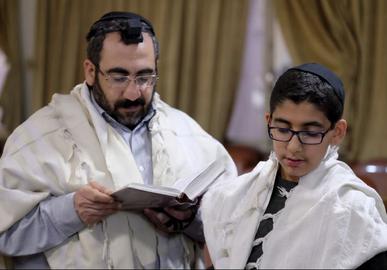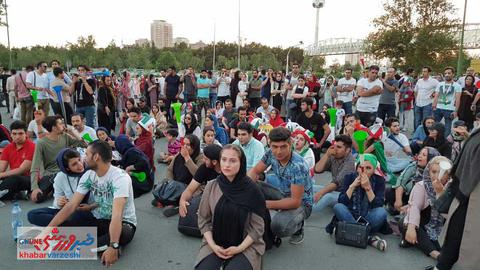This is the latest article in IranWire’s series Decoding Iranian Politics. The series examines the building rift between Iran’s various political factions, goes behind the scenes of the country’s fiercest political scandals and assesses what impact the complex web of government institutions has on Iranian politics today, as well as taking stock of some of the most defining moments in recent history.
What You Need to Know about Anti-Jewish Attitudes in the Islamic Republic of Iran
In February 2018, the mass arrests of environmental activists hit the headlines in Iran. The intelligence agency of the Islamic Revolution Guard Corps (IRGC) accused the detainees of spying for foreign countries (in particular, Israel and the US).
Iranian hardline media also published many security-related accusations against a number of environmental activists. One of the allegations was that three of these activists were “Jews.” The claim was not true, but the fact that hardliners used it to justify security allegations against people alarmed human rights activists, who saw it as a clear indication that anti-Jewish conspiracy theories were being circulated within Iran’s hardline circles.
How do Iranian Hardliners Propagate Anti-Jewish Conspiracy Theories?
Since 1979, many state officials have often regarded the Iranian Jewish community as being a potential “collaborator with Israel”. This mistrust has sometimes led to persecution in the courts, and to intelligence agents exerting pressure on Jewish communities.
One of the most famous cases of these persecutions took place in 1999, when 13 Iranian Jews were arrested on charges of espionage for Israel. Iran’s judiciary could not prove that they had really collaborated with Israel’s intelligence agencies and most of them were released after a few years in prison. Nevertheless, the 1999 case had a significant impact on the Iranian Jewish community and, according to the its leaders, led to the “third wave of emigration” of Jewish people from the country. The first and the second waves had taken place in the aftermath of the 1979 revolution following the establishment of a religious regime, and then over the course of the Iran-Iraq War because of the dire conditions the war produced. It is important to bear in mind that before the Islamic Revolution, more than 100,000 Jewish people lived in Iran. Today, the number of Jewish people in the country is estimated to be between 15,000 and 20,000.
In an effort to reduce hardliners’ mistrust, Iranian Jewish leaders have often tried to establish good relations with Iranian regime authorities. For instance, they have always condemned Israeli government policies as well as the pressure the US has applied on the Islamic Republic of Iran. Under the presidencies of Hassan Rouhani and Mahmoud Ahmadinejad, the sole Jewish member of Iran’s parliament has accompanied the two Iranian presidents on annual trips to the UN General Assembly During such trips, the MP, Siamak Moreh Sedgh, made clear his support for Tehran’s stance on international issues.
At the same time, Iranian leaders have always argued that the Islamic Republic’s anti-Israel policies do not mean that they are anti-Semitic. Nevertheless, many Iranian state institutions – particularly those under the control of associates of Iran's Supreme Leader Ayatollah Ali Khamenei – propagate anti-Jewish conspiracy theories.
For instance, a number of Iranian hardline media outlets, publishers and propaganda organizations have published and continue to publish anti-Semitic material — books, articles, films and so-called documentaries. Such products propagate anti-Jewish conspiracy theories by blaming Jewish people for many of the world’s problems. Some of them even present totally fabricated stories about the activities of the Jewish community throughout Iran’s contemporary history.
Despite the fact that most of this propaganda is produced by hardliners affiliated to state institutions, some Iranian opposition activists have demonstrated anti-Semite tendencies, too. For instance, a number of Iranian regime opponents have resorted to using anti-Jewish conspiracy theories to harm the reputation of a number of regime officials, claiming they are Jewish descendants. Mahmoud Ahmadinejad is one such official to have been subjected to such claims, even after making tough anti-Israel statements and inviting the world’s most provocative Holocaust deniers to the “International Conference to Review the Global Vision of the Holocaust” in 2006 — a move that made international headlines.
The claims about the Jewish origin of a some Iranians officials are baseless, but using this tactic to “discredit” politicians indicates that anti-Jewish conspiracy theories have a certain level of acceptance among some groups of regime opponents.
Are Iranian Laws anti-Semitic?
The legal system of the Islamic Republic of Iran introduced a set of discriminative laws against non-Muslim citizens, including the members of the Jewish community.
According to Iran’s constitution, this community has a permanent seat in Iran’s parliament. But Jewish people and other non-Muslims are not legally eligible to hold most state positions. For instance, they are not allowed to run for president or occupy any position in Iran’s judicial system. And there are many other discriminatory measures that are not specified in the law but have consistently been carried out against Jewish people. For instance, as the leaders of the Jewish community have indicated, the government offices have not recruited Jewish people since the establishment of the Islamic Republic of Iran.
Iran’s judicial system perpetuates many other discriminations against non-Muslim citizens, too. For instance, if a non-Muslim converts to Islam, they inherit the entire family assets, depriving other heirs of their financial rights. According to the leaders of the Jewish community, this legal discrimination has encouraged some members of the community to pretend they have converted to Islam, motivated by financial reasons.
In addition, under Iranian law, the court can completely ignore the testimony of a non-Muslim against a Muslim. If a Muslim kills a non-Muslim, the murderer will not face capital punishment, whereas this punishment can be applied if the victim is a Muslim. These discriminatory measures, and a number of similar measures, directly affect Iranian Jewish people, as well as the country’s other non-Muslim citizens.
To What Extent do Iranian Citizens Advocate Anti-Jewish Views?
The propagation of anti-Jewish conspiracy theories by Iranian hardliners has undoubtedly affected various layers of Iranian society. It is also undeniable that a considerable number of Iranian people have often had negative views regarding members of the Jewish community. Nevertheless, there is evidence that suggests that anti-Semitism is possibly much less widespread in Iran in comparison to the other countries of the Middle East and North Africa region.
Astonishing statistical evidence regarding this issue emerged from a 2014 opinion poll commissioned by the Anti-Defamation League (ADL), an international organization that fights anti-Semitism. According to the poll, Iranians were the least anti-Semitic people in the Middle East and North Africa region (with the exclusion of Israel). This poll demonstrated that Iranian respondents scored the lowest (56%) in terms of holding negative views about Jewish people, while in other countries in the region, the figure ranges from 69% in Turkey to 93% in the Palestinian territories.
The 2014 ADL poll showed that a large part of Iran's population had not been influenced by the negative narratives the country's hardliners had presented about Jewish people. One could even conclude that because of their distrust of the ruling hardliners, many Iranians may simply reject much of what the regime says, including the anti-Jewish propaganda it propagates.
visit the accountability section
In this section of Iran Wire, you can contact the officials and launch your campaign for various problems

























comments